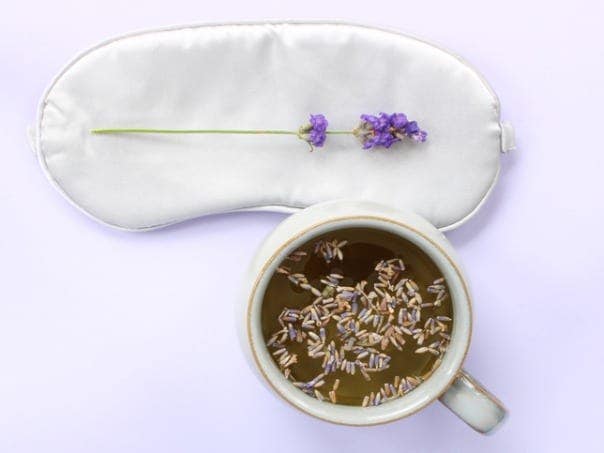Sleep Health
Published February 14, 2022
13 minHerbs For Sleep: 13 Natural Herbs for Better Sleep
Having trouble sleeping can lead to many physical and mental ailments in the longer run. But in a world of cutting-edge technology and advanced sciences, one thing that you can still benefit from is c

Table of contents
Why Use Herbs for Sleep?How Do Herbs Help You Sleep Better?13 Natural Herbs For SleepHow to Use Herbs for Sleep?Tips for Better SleepFrequently Asked Questions
Having trouble sleeping can lead to many physical and mental ailments in the longer run. But in a world of cutting-edge technology and advanced sciences, one thing that you can still benefit from is consuming organically produced foods. Their charms and benefits are numerous, and these herbs for sleep can lead you towards a happy slumber all the way. This article will discuss 13 natural herbs for better sleep that can help you overcome your insomnia troubles in no time.
Why Use Herbs for Sleep?
Herbs have powerful sleep-enhancing properties that can calm your nerves and give you a good night’s sleep. They help the body’s natural processes before and during sleep. So if you feel the need for a good night’s rest, you can try these natural herbs to help you sleep better. Some of these herbs are:- Lavender
- Chamomile
- Valerian Root
- Magnolia Bark
- Ashwagandha
- Passionflower
- Wild Lettuce
- Ginseng
- Holy Basil
- St. John’s Wort
- Mint
- Hops
- California Poppy
How Do Herbs Help You Sleep Better?
Sleep deprivation is often caused by stress, hectic schedules, improper rest, and diet. Stress affects the production of serotonin which affects the sleep cycle. Consuming natural herbs can help manage insomnia by balancing the serotonin levels. The most common way to treat insomnia is to balance your serotonin levels. And herbs let you manage your serotonin levels easily. Natural herbs being high in tryptophan improve the production of serotonin. And when your serotonin levels are balanced, you can enjoy a good night’s sleep. Some herbs relax your nerves, while others help reduce your stress levels. In addition, there are other natural herbs that lower your heart rate and relax your muscles.13 Natural Herbs For Sleep
Although there are many herbs to help you out, these are highly effective and give immediate results. If you ever feel the need to take herbs for sleep apnea, then you can pick some from the below-mentioned list. Let’s explore, shall we?1. Lavender
It is the most common herb that helps the body rest. Many women consume lavender for its other health benefits, but the main benefit that remains popular among men and women is its ability to induce sleep. Lavender oil is great to diffuse in your bedroom 30 minutes prior to sleep. It’s also pretty popular as lavender tea. It is known for its appealing scent, which is why it is a common component in perfumes, and bath and body products.2. Chamomile
Like lavender, this herb also has other beneficial health properties, but boosting sleep remains popular. Mostly, people consume Chamomile tea to regularize their sleeping patterns. It has worked wonders for others, while it might not be effective for the rest. This daisy-like plant is extremely common in herbal infusions and herbal medicine. Many people turn to herbal teas, in general, as a quick fix for sleeplessness if they don’t want to take pills or sleep supplements. To make it even more useful, take chamomile tea at night as part of a regular self-care ritual.3. Valerian Root
Since the 18th century, people have used Valerian root as a sleep aid. Ever since the early centuries, the root has been used in perfumes and bath & body products. This herb for sleep has different efficacy levels, and while valerian root may not relax you as much as other herbs for sleep, it is known to promote relaxation. Although some conflicting research exists, valerian may help quiet your racing thoughts at night, thereby promoting better sleep. Valerian root is only one among many herbs that have been used for centuries, dating back to ancient Greek and Roman times.4. Magnolia Bark
Magnolia is one of the most effective herbs for promoting sleep, so much so that it is not advisable to take it during the daytime or when driving a vehicle. It is thought to work by relaxing the mind and inducing drowsiness and deep REM sleep. One capsule a day, short-term, should be enough to correct your body’s circadian rhythm. Another benefit of magnolia bark herb is that when taken orally, it may help lower the body’s cortisol levels, the stress hormone. It’s important to note that while magnolia bark shows promising sleep results, as with many potent herbs, there are drug interactions to consider. If you are on other medications, always consult your physician before taking herbal supplements, like magnolia bark.5. Ashwagandha
It is a medicinal herb commonly used to beat insomnia. The leaves of the plant have sleep-promoting properties. Triethylene glycol soothes the nerves and eliminates stress, relieves sleep anxiety while helping you in regulating your sleep cycles. It acts as a sedative, making it a great alternative to OTC medications that adjust the body’s sleep cycle.6. Passionflower
It is a commonly found herb in North America that helps induce sleep. Studies have shown that the passionflower is most effective when used with other herbs. These herbs are cultivated in Africa, Asia, Europe, and Australia. It is commonly used to calm the mind before surgery, while some people take passionflower to reduce pain, beat insomnia, and attention deficit-hyperactivity disorder.7. Wild Lettuce
Wild lettuce, also known as lactucarium and wild spunella, reveals itself in the form of soft fuzz on top-water plants. It contains milky fluid with calming effects that soothe your nerves when you're feeling anxious or sleepless at night; it relieves pain caused by insomnia symptoms like restlessness leg syndrome (RLS), whilst simultaneously alleviating any side effects associated with these common homeopathic remedies for child's ailments which includes nausea due to medication overload - this herb can be used safely without worry because its minimalistic properties allow precise targeting!8. Ginseng
Ginseng has been used for centuries in traditional Chinese medicine to help with insomnia. The short, slow growing plant promises effects under the mattress and scientists after several clinical studies too believes that it supports human health nutritionally while being generally consumed as a dietary supplement by way of ginseng infused tea which shows calming properties helping your brain slow down allowing you more time sleeping soundly through night-time restlessness or mental fatigue caused from stress9. Holy Basil
Holy Basil, a herb commonly used in medicine for centuries to help with numerous health conditions including nausea, bug bites, skin rashes and bronchitis has significant effects against sleep disorders. This powerful plant promotes better sleeping by easing anxiety as well as stress which can hinder your restful nights’ slumber. It also relieves aches and discomfort while you're awake or asleep!10. St. John’s Wort
St. John’s Wort is often called a “weedy herb,” because it grows wild in pastures and can be fatal to grazing cattle. However its growth has some therapeutic benefits for humans so this weed becomes an important medicinal plant. The yellow flowers are rich with tryptophan which boosts serotonin synthesis leading people having depression symptoms towards getting better sleep patterns as well feeling less anxious or moody without any side effects from prescription medications usually associated with these conditions11. Mint
If you're having trouble sleeping, try drinking a cup of peppermint tea before bed. The natural muscle relaxant will ease built-up tension in your body and prepare for slumber while also aiding digestion with its antibacterial properties! You may not want to drink any other type since mint leaves enhance flavor when added into sleepy teas like hop or passion flower -- just don't forget about them next time (or perhaps ever).12. Hops
Hops are used as an effective treatment option for insomnia as they contain the sleep-inducing chemical methylbutenol. In fact, back in the 1900s physicians recommended patients drink chamomile tea with hops mixed into it. As the herb has a bitter taste, if mixed with chamomile it tastes better and works wonders altogether.13. California Poppy
The California poppy is a beautiful flower with many medicinal properties. If you are looking for something that will help alleviate your pain, this plant might be just what the doctor ordered!The ornamental plant has origins in both America and Mexico which makes it an interesting choice when considering its various health benefits--it can relieve mild aches or injuries as well provide sedative qualities sometimes associated with prescription medications like Valium (or other similar drugs). For those who want stronger effects there's always tea infused by fresh flowers.How to Use Herbs for Sleep?
Herbs can be considered a natural sleep remedy. These are completely safe to use and have no side effects whatsoever. But it is wise to be sure and have a word with your doctor before consuming herbal tea or using some herb for sleep. There are numerous ways one can use these herbs effectively. Know how you can consume herbs for better sleep:- Drinking or Consuming
- Oil Therapy
- Herbal Bath
- Inhale Therapy
- Risks and Precautions to Consider Before Using Herbs
Tips for Better Sleep
While having a good night’s sleep, it is important to maintain sleeping hygiene. It is all about following healthy sleeping habits. These habits should be kept in mind when trying to regulate your sleep patterns. Here are some useful sleep hygiene tips you should follow. Your behavior during the day also affects your sleep cycles. Read 25 tips to sleep better .- Keep the sleep cycle consistent
- Limit the caffeine intake
- Stay away from electronic devices
- Avoid napping
- Manage stress before going to bed












